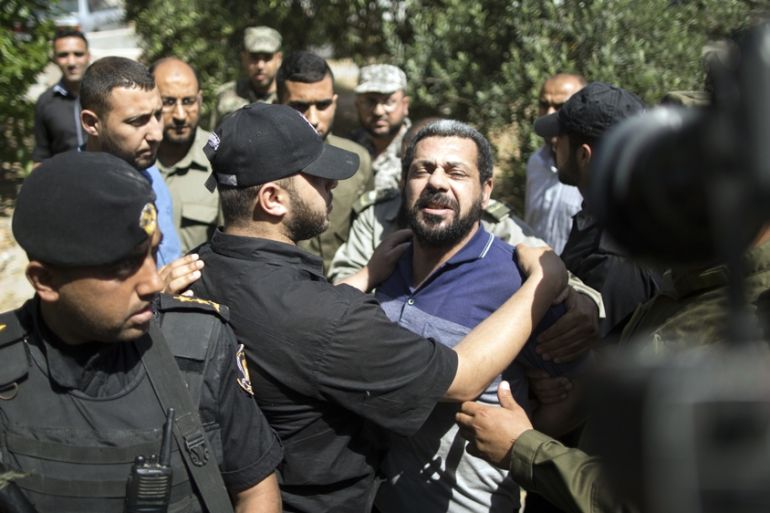Three sentenced to death over killing of Mazen Faqha
Two suspects sentenced to death by hanging while a third suspect is to face a firing squad, Gaza court decides.

A court in the Gaza Strip on Sunday sentenced three men to death over the killing of a Hamas military commander, which Hamas has blamed on Israel.
After a four-day trial, two of the accused were sentenced to be hanged and one to be shot, the military court announced.
Keep reading
list of 4 itemsIsraeli air attack kills three sons of Hamas chief Ismail Haniyeh in Gaza
ICJ updates: Nicaragua’s case against Germany over Israel’s war on Gaza
How will Iran respond to Israel’s attack on its Damascus consulate?
The killing of Mazen Faqha in the middle of the Hamas-run Gaza Strip on March 24 shocked the movement and raised the possibility of a new round of violence with Israel.
In Sunday’s court ruling, suspect Ashraf Abu Leila, 38, was sentenced to hang after being convicted of murder.
The others were identified only as Hisham A, 44, who was also sentenced to hang, and Abdallah N, who was to face the firing squad. They were convicted of collaborating with Israel.
Sulaiman Awad, the head of Hamas’ military court, said the verdicts were final and could not be appealed.
“The rulings are the last step before implementing the capital punishment,” he told journalists. “This is the first time the Zionist enemy resorts to activating a number of collaborators for the implementation of this crime.”
![Ashraf Abu Leila, centre, is considered the main suspect behind the killing of Faqha [Mahmud Hams/AFP]](/wp-content/uploads/2017/05/8e147f1cc5344bde87cd4ade13db77c0_18.jpeg)
In the aftermath of the killing, Hamas implemented border restrictions on those seeking to leave the Palestinian enclave.
Israel has not denied or confirmed the accusations.
Iyad al-Bozom said the three suspects would be executed “soon”.
Faqha ‘shot four times in head’
Faqha had been accused by Israel of forming cells for Hamas’ military wing in the Occupied West Bank and spent years in an Israeli jail before being released into the Gaza Strip as part of a 2011 prisoner exchange deal.
Hamas said Faqha was shot four times in the head with a silenced gun. The group said that Israel and its “collaborators” were responsible for the killing.
“No one would benefit from this crime except the Zionist enemy and not to mention, the Zionist enemy announced in all of its media that the leader, Mazen Faqha, is on the top of the wanted list,” senior Hamas official Salah al-Bardawil told Al Jazeera in March.
READ MORE: What is next for Hamas?
Last week, Hamas released what it said was a recording of the confessions of the accused.
Images allegedly showed three men, presented as the murderer and his two accomplices, confessing to their roles, although their faces did not appear.
The Gaza Strip has been under an Israeli blockade for a decade, while Egypt’s crossing with the enclave has also remained largely closed in recent years.
The Islamic Jihad movement said in March that Faqha’s assassination marked the beginning of “a new offensive” by Israel against the Palestinians in Gaza, and that the group had the right to respond and defend itself.
Thousands of Palestinians poured on to the streets for Faqha’s funeral in March.
Human rights groups concerned
After Sunday’s ruling, human rights groups issued concern.
“Executions without the ratification of a president are tantamount to extrajudicial executions,” Hamdi Shaqoura, the Gaza-based director of the Palestinian Center for Human Rights, told Al Jazeera.
“We are talking about a summary trial carried out in just a few days … We are afraid that no proper guarantees for fair trial were offered to [the suspects].”
Shaqoura said while “nobody argues about the severity of the crime and assassination”, the death penalty had “never proved to be a deterrant to crime”.
Last week Omar Shakir, Human Rights Watch director for Israel and the Palestinian territories, said: “Widespread coercion, torture and routine deprivation of detainees’ rights by Hamas security services in Gaza call into question whether these confessions were in fact voluntary or may have been extracted under duress.”